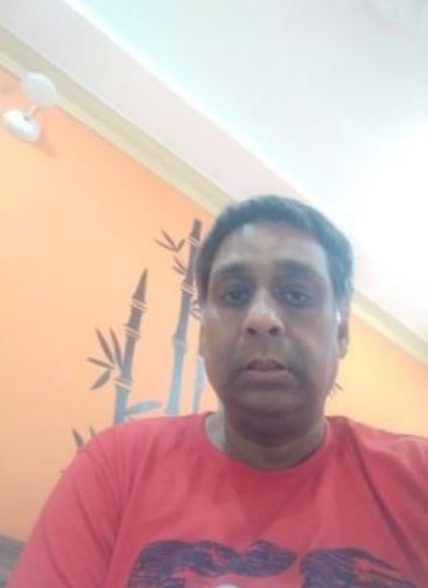Sujay Rao Mandavilli: IT professional, Anthropologist, Researcher and Post-colonial thinker.

Institute for the study of the globalisation of science (ISGOS)
Scholars and Intellectuals for Mankind (SCHIMA)
Movement for open, transparent, high-quality and ideology-free science (MOTHIS)
Think tank for the rationalization and modernization of pedagogy (TH-RAMP)
Movement for the re-orientation of economic studies (MORES),
Think tank for accelerating the rate of progress in foundational science (TH-ARPIFS)
Think tank for the reexamination of the role of religion in society (TH-RERORS)
Founded by
Sujay Rao Mandavilli
Sujay Rao Mandavilli is an IT professional and a born-again Anthropologist, researcher and post-colonial thinker with major contributions to various fields of Anthropology and Social Sciences. He completed his Masters in Anthropology from the prestigious “Indira Gandhi National Open University” (IGNOU) in New Delhi, India in 2020 with a first class. He has made major contributions to Anthropological Economics, the Sociology of Science, theories of socio-cultural change, Identity theory, Historiography, language dynamics, scientific method, the philosophy of science, Indo-European studies, the Aryan Problem, and the identity of the Harappans. He also has a large number of basic and foundational contributions to scientific method. His hypothesis is that most fields of Social sciences which are based on a study on social and cultural variables, are based on old Eurocentric paradigms, and that better theories can only come from intellectual multipolarity, and Ethnographic data collected from different parts of the world. He believes this will lead to better scientific research, and greatly boost scientific output in different parts of the world that have hitherto lagged behind the West in scientific research. He also believes intellectual revolutions and enlightenments are required in different parts of the world, like they have taken place in the west.
He has published over one hundred core research publications and ten books. All his publications have been republished in Social Science Research Network, or SSRN and through other publishers. He is the Founder-Director of the Institute for the Study of the Globalization of Science (Registered as the Globalization of Science Trust) which is has already started empaneling a group of researchers and scientists to plan its next course of action. He strongly believes that the ‘Globalization of Science’, with a particular emphasis on the social sciences, must become one of the major movements of the Twenty-first century as we move away from colonialism and imperialism. He has also founded a think tank called “Scholars and intellectuals for mankind” (SCHIMA), another think tank called the “Open, transparent, high-quality, and ideology-free science movement” riding piggyback on his large number of publications on scientific method, and a blog called “Abhilasha: This is not utopia”. Among his other missions, are revitalizing pedagogy for the twenty-first century, and reexamining the role of religion in the twenty-first century for which strategies have been devised. He has also launched a youtube channel in furtherance of these goals.
Also refer his publications on Researchgate.
Memberships
- Lifetime Member, Indian Science Congress Association (L28080)
- Lifetime Member, Linguistic Association of India (LM-027/2015)
- Affiliate, ARC Centre of Excellence on the Dynamics of Language, Australian Research Council
- Lifetime Member, Dravidian Linguistic Association (1211/2015)
- Member, Society for Applied Anthropology (SfAA)
- Member, European Association of Social Anthropologists
- Lifetime Member, India Innovators Association
- Member, TRIZ Innovation India
- Honorary Member, Quarterly Franklin Membership (Membership ), London Journals Press
- Lifetime Member, National Population Control Mission of India Also
- Associate Editor, Journal of Educational Sciences Research
- Reviewer and Associate Editor, Indian Journal of Innovative Science and Research Technology (IJISRT)
- Reviewer, International Journal of Research and Scientific Innovation (IJRSI) ISSN: 2321 – 2705
- Member, Thinkers 360
- Peer reviewer, Academia global and public health
- Reviewer, Current Science
- Member, Editorial Board, Macrothink Institute
- Nominated for Asia’s Who’s who Men and Women of Achievement (Rifacimento International)
- Accepted for Marquis Who’s who, 2018
- Mentor, Science India (www.scienceindia.in)
- Member, Mendeley Advisory Group
- Reviewer, Journal of the Indian Anthropological Society
- Empaneled as reviewer, Pragati journal of Indian economy
- Reviewer in the International Journal of Research and Innovation in Social Science (IJRISS).
- "Reviewer" for Arthshastra Indian Journal of Economics & Research
- Member, International Journal of Science and Research (IJSR)
- Listed in Atal Ranking of Institutions on Innovations achievements database 2021 Institute ID:ARI-A-54718 (Institute for the study of the globalization of science)
- Reviewer, Bakhtiniana, Revista de Estudos do Discurso
- Proposal reviewer, Swiss National Science Foundation (Ambizione grants)
- Assessor, National Skill India Mission, Ref No. Nsim 2563
Awards

India Achievers Award, 2020
India Achievers Forum

InRes Research Excellence Award, 2024
Institute of Researchers, (Institution of Biomedical Engineers (India)), Recognized and accredited by MSME

Best Researcher Award
International organization for academic and scientific development (IOASD)

Best Research Award (2024)
Best researcher awards, 2024, International academic achievements and awards, Arts and humanities
Mission statement
To democratize and universalize frameworks and paradigms particularly in, though not necessarily limited to, various fields in the social sciences, and free them from the shackles or limitations of Eurocentrism and other ideologies, while at the same time laying the groundwork for science, intellectualism and pedagogy particularly in developing countries with the view to maximizing self-fulfillment and social, cultural and economic productivity.
The six pillars of his mission
He had founded the “Institute for the study of the globalization of science” (ISGOS) in 2017, which was registered in India as “The globalization of science trust”. He had also launched the think tank “Scholars and intellectuals for mankind”, (SCHIMA) subsequently, and another think tank called the “Open, transparent and high-quality science movement”. The following are the six pillars of the movement in a nutshell:
01
Revitalizing various fields of the social sciences for the twenty-first century and beyond by moving them beyond colonialism and imperialism: This is the reason why we had published over one hundred core papers, and eight books all of which are online.
02
Creating intellectual revolutions in various parts of the developing world on the lines of the renaissance and enlightenment that took place in Europe a couple of centuries ago. We had published a paper on twenty-first century intellectualism in 2023. In addition refer to our various other papers which contribute to this mission.
03
Rearming pedagogy and education systems for the twenty-first century and beyond. We had published papers on anthropological pedagogy, and the sociology of science, besides a book on rebooting and revitalizing pedagogy for the twenty-first century pedagogy.
04
Modulating the role of religion in the twenty-first century and beyond through better education, social sciences research techniques, and a concerted effort among governments. Refer to our book on the role played by religion in the twenty-first century and beyond.
05
Developing bottom up developing models for the developing world which would contribute to our other objectives as well. Refer to our papers on anthropological economics, and our book on economic development models.
06
Environmental movements must be integrated, holistic, and must also take into account and consideration, the needs and requirements of people in developing countries. We also need to launch the “Low populations for the environment” movement (LOPE movement) as relatively low birth rates can lead to an “Evergreen demographic boon”. We also simultaneously need to launch a “High-quality human resources movement” for better quality human resources.
Mandavilli foundation
Awards and scholarships are given by the Mandavilli foundation as follows
Rules for awards and prizes
- Researchers must be active in any field of the social sciences. This includes anthropology, sociology, economics, psychology, philosophy, political science, historiography, etc. for any clarification, please write to me.
- Must have demonstrated a commitment to freeing social sciences from the shackles of Eurocentrism or laying the foundations of social sciences in the developing countries. This must preferably not be limited to one single country, but to developing countries, and to science as a whole.
- Must be from a developing country in Africa, South America, South Asia, South East Asia, Middle East, Near East and the Philippines. Due to technical and operational challenges, we are not accepting submissions from Pakistan and Afghanistan. Submissions from China are also not accepted. For any clarifications, please write to me.
- Researchers must have carried out research in the aforesaid regions, and must be still residents of those regions at the time of claiming the award.
- Must have had a history of research and research publications at least five years.
- Must have published at least five research papers in peer-reviewed journals.
- Publications must have been in English. In case the original paper was in another language, translation must have also been published in a peer-reviewed journal in English.
- Journal must be reasonably reputed, and must not be classified or categorized as fake or non-genuine.
- Researcher must be associated with a university, reputed research institute, or a think tank.
- Non-affiliated researchers may apply provided they furnish two references or two testimonials from reputed affiliated scholars.
- Researcher must have a valid Masters degree in any field.
- Copies of the papers must be submitted for evaluation.
- No registration charges are applicable at present.
- We will issue a certificate and a testimonial. These will be in soft copies only. There are no cash awards at present.
- Selection will be purely based on merit.
- There are no limits to the number of awards that can be given in a year. Alternatively, no awards may be given in a particular year in the absence of meritorious candidates.
- The main categories of awards are “Global star award for the year …..” (Unlimited), and “Global Best researcher of the year award for ….” (only one)
- Special awards shall also be given for outstanding papers in Economics and Pedagogy for work that boosts economic outcomes in developing countries.
- The form attached must be fully and properly filled in.
- Claims may be referred to a subcommittee if required. The decisions of the judges and the panel shall be binding and final.
Rules for Ph.D scholarship
- This scholarship is applicable to researchers pursuing research in an Indian university.
- The Ph.D program must be approved by the UGC or the University Grants Commission.
- The Ph.D program must be in the humanities.
- The Ph.D program must be centered on the ideals of the globalization of science movement, and must benefit developing countries greatly.
- Letter of admission must be provided from the university.
- Research proposal must have been approved by the university.
- Letter must be provided from the guide.
- We are starting with one scholarship per year. Rs 5,000 consolidated for the course. Program may be expanded at a later date.
- The form attached must be fully and properly filled in.
- Proposals may be referred to a subcommittee if required. The decisions of the panel shall be binding and final.